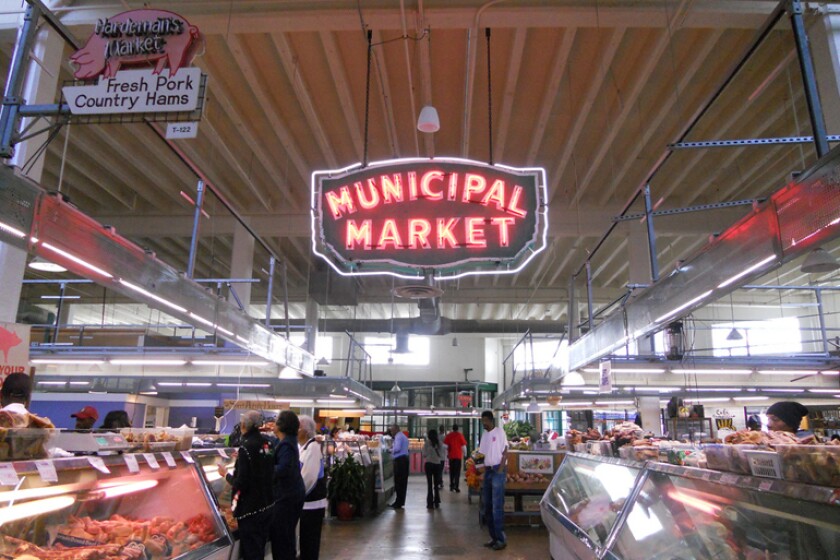The Atlanta Regional Commission, the area’s metropolitan planning organization, took over two blocks of the city's Sweet Auburn neighborhood to demonstrate that features that cater to an older population also make life better for children and young adults too.
Volunteers marked off wider sidewalks and a protected bike lane on Auburn Avenue. They set up a health clinic and a farmer’s market. The courtyard in a 14-story retirement home featured an oversized chess board, gardening classes and other activities aimed at giving residents accessible entertainment.
“The defining trend of the 21st Century is longevity. We need to understand what it means for human beings to live longer than they ever have before. It impacts all aspects of community and society… but particularly local government,” said Kathryn Lawler, the head of the regional commission’s efforts on aging.
The need is especially pressing in Atlanta, where a recent study projected that 90 percent of seniors would have poor access to transit by 2015. That is the highest rate for any large metropolitan area in the country.
The share of people of retirement age is rapidly increasing, and will continue to do so as the Baby Boomers retire. By 2030, one in five area residents will be age 60 or older. The demographic changes mean older residents will make up an increasingly large part of the economy, so the region must adjust to accommodate them, Lawler said. “It’s the right thing to do, but it’s also a really smart economic strategy now.”

Older residents browse the Sweet Auburn Curb Market. (FlickrCC/Municipal Market)
The regional commission has been studying the needs of the aging population for several years, and it has been working with local governments to prepare. But change has been slow.
“We have to get to scale a lot faster than we are right now,” Lawler said. “We are doing amazing things, but when you look at the demographics, the pace at which we’re moving isn’t going to work. We have to jump start change.”
That is why the group teamed up with Mike Lydon, a leader in the “tactical urbanism” movement. The idea is to use low-cost, local resources to demonstrate potential changes that could improve a neighborhood.
The benefits of making temporary changes go beyond just having local residents see the potential in their neighborhood, Lydon said. Volunteers who build the enhancements own the ideas and then push to make them permanent.
It is an approach other cities are using. Tommy Pacello, the manager of Memphis’ innovation delivery team, who helped train volunteers for the Atlanta project, said his city has used tactical urbanism to work in economically distressed areas such as South Memphis, where the unemployment rate has reached 33 percent. The approach, Pacello said, has been received well by residents of all ages.
So, in Sweet Auburn last weekend, volunteers placed flower planters to separate bike traffic from auto traffic. They improved street lighting. One vacant lot was used for a “walk-in” (rather than a “drive-in”) movie showing of a remake of "Steel Magnolias" with an African American cast. A vacant lot with an abandoned fast-food restaurant hosted exhibits from the Auburn Avenue Research Library on African American History and Culture, which once stood at the site.
But organizers took advantage of the permanent features in Sweet Auburn as well. The neighborhood, which was once the commercial hub of the black community in Atlanta, has one of the only urban senior centers in the area. It is also on the route of a soon-to-be-completed streetcar linking the neighborhood to Georgia State University and Centennial Olympic Park.

Construction of the soon-to-be-completed streetcar. (FlickrCC/J.C. Burns)
Access to transportation is crucial for elderly residents, Lawler said. That is why organizers promoted the streetcar access with a race along the rails and installed the protected bike lanes. Riders between the age of 60 and 79 accounted for more than a third of the increase in bike trips between 1995 and 2009, according to People For Bikes, a sponsor of the Atlanta event.
Over the weekend, a local resident also temporarily revived the defunct radio station WERD, the first black-owned radio station in the country, over the internet and in the neighborhood. Other activities included exercise classes, yoga, tai chi, Chinese dance performances and a capoeira demonstration.








